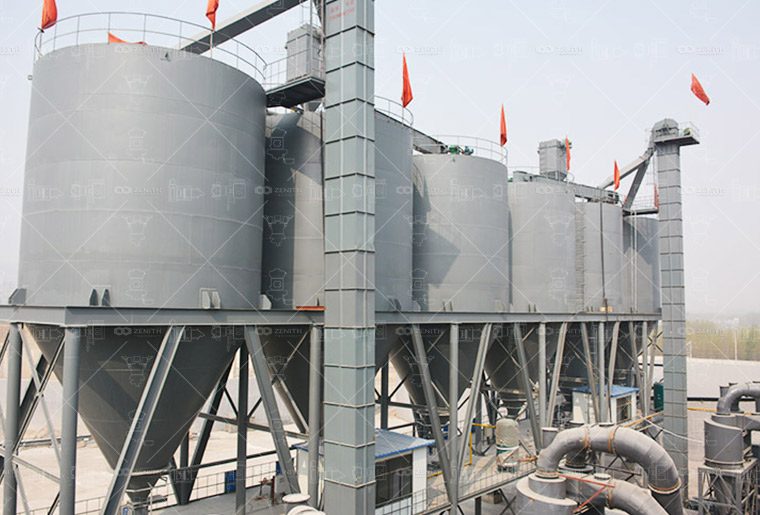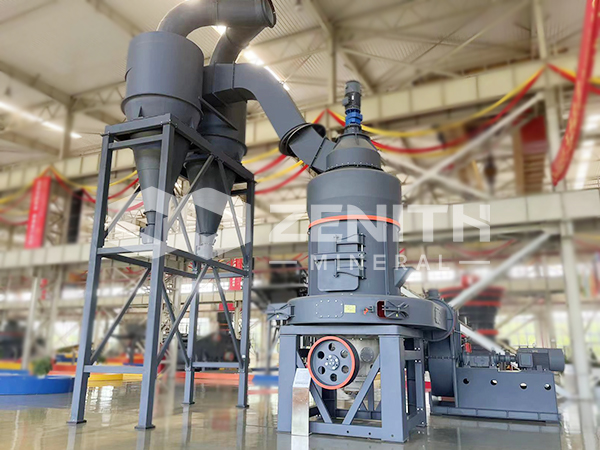Nigerian high-calcium limestone grinding mill finished product specification 325 mesh
2025-11-19 00:57:00
In the rapidly developing construction and industrial sectors of Nigeria, the demand for high-quality calcium carbonate products has seen significant growth. Nigerian high-calcium limestone, known for its exceptional purity and mineral composition, presents both an opportunity and a challenge for processors seeking to meet international quality standards. The specific requirement for 325 mesh (approximately 45 microns) fineness represents a crucial specification for numerous industrial applications where consistent particle size distribution directly impacts product performance.

Shanghai Zenith Machinery, with decades of specialized experience in mineral processing equipment, has developed targeted solutions specifically addressing the unique characteristics of Nigerian limestone deposits. Our extensive research indicates that achieving the optimal 325 mesh specification requires careful consideration of several factors including mineral hardness, moisture content, and the desired production capacity. Through rigorous testing at our technology center, we've verified that multiple grinding mill configurations can successfully meet these requirements while maintaining operational efficiency and cost-effectiveness.
Technical Solutions for 325 Mesh Limestone Powder
For Nigerian limestone processors targeting the 325 mesh market, Zenith offers several proven grinding technologies, each with distinct advantages depending on specific operational requirements:
The MTW European Trapezium Mill stands out as an exceptional choice for medium to large-scale operations requiring consistent 325 mesh output. With capacity ranging from 3-22 T/H and the ability to process input sizes up to 35mm, this system provides remarkable flexibility. The modular impeller adjustment system allows operators to fine-tune output fineness with minimal downtime, a crucial feature for producers serving multiple market segments. Field data from Nigerian installations demonstrates energy consumption reductions exceeding 60% compared to traditional ball mills, significantly impacting operational costs in energy-intensive grinding applications.
_1763485020169.jpg)
For operations prioritizing proven reliability and lower initial investment, the MTM European Trapezium Mill offers three decades of demonstrated performance in mineral powder production. The stable grinding performance characteristics make it particularly suitable for Nigerian operations where consistent 80-400 mesh output is required, with 325 mesh representing the sweet spot in its operational range. The electromagnetic vibrating feeder ensures consistent material flow to the grinding chamber, while the high-efficiency impeller fan (85% air induction efficiency) contributes to superior classification accuracy.
Advanced Grinding Technologies
When project specifications demand higher automation levels or unique space constraints, Zenith's LM Vertical Grinding Mill presents an compelling alternative. The vertical roller mill design incorporates advanced grinding principles that make it exceptionally suitable for 24-hour continuous operation scenarios common in large-scale Nigerian mineral processing plants. The compact integrated design reduces footprint requirements by approximately 50% compared to ball mill systems, while the automated control system enables remote operation capabilities – particularly valuable in regions with specialized labor shortages.
For processors requiring ultimate flexibility in product fineness, the XZM Ultrafine Grinding Mill offers arbitrary adjustment between 325-3250 mesh with single classification capability. The variable frequency drive (VFD) controlled classifier enables operators to precisely target 325 mesh specifications through simple control panel adjustments, eliminating the need for mechanical modifications. This technology has demonstrated particular value for Nigerian operations serving both construction and industrial mineral markets from a single production line.
_1763485020175.jpg)
Material Characteristics and Processing Considerations
Nigerian high-calcium limestone typically exhibits calcium carbonate content exceeding 95%, with minimal silica and other hard impurities that might accelerate wear in grinding systems. This favorable composition allows for higher throughput rates and extended component life compared to processing more abrasive geological formations. However, variations in moisture content between dry and rainy seasons necessitate proper material handling considerations, particularly for open-pit mining operations.
The working principle common across Zenith's grinding solutions involves precise classification systems that ensure consistent 325 mesh output. In the MTW and MTM series, crushed materials are transported to powder selectors via fan airflow, where precise classification separates qualified fine powder from coarse material requiring regrinding. This closed-circuit system operates under controlled positive and negative pressure conditions, with integrated pulse dust collectors ensuring compliance with increasingly stringent Nigerian environmental regulations.
_1763485020177.jpg)
Economic and Operational Advantages
The selection of appropriate grinding technology for Nigerian high-calcium limestone processing significantly impacts project economics. Zenith's energy-efficient designs demonstrate particular value in regions experiencing power reliability challenges or high electricity costs. The documented 60% reduction in energy consumption compared to ball mills translates to substantial operational savings, while reduced maintenance requirements minimize production interruptions.
For Nigerian investors evaluating limestone processing projects, the comprehensive approach offered by Zenith includes everything from initial material testing to complete system design and ongoing technical support. With overseas offices covering more than 30 countries and a service network extending across Africa, project developers benefit from localized support combined with global technological expertise.
_1763485020179.jpg)
The future of Nigerian limestone processing continues to evolve, with increasing demand for precisely controlled 325 mesh products across construction, agriculture, pharmaceutical, and industrial applications. Zenith's commitment to research and development ensures that our grinding technologies remain at the forefront of efficiency, environmental compliance, and operational reliability – supporting the growth of Nigeria's industrial sector while maximizing the value derived from the country's abundant mineral resources.
Frequently Asked Questions
What is the typical energy consumption for grinding Nigerian limestone to 325 mesh?
Energy consumption varies by equipment selection and material characteristics, but Zenith's MTW and MTM series trapezium mills typically achieve 60% lower energy consumption compared to traditional ball mills when processing Nigerian high-calcium limestone to 325 mesh specification.
Can the same grinding mill produce different fineness products for various applications?
Yes, most Zenith grinding mills feature adjustable fineness controls. The MTW and MTM series utilize modular impeller adjustment systems that allow production of different fineness products (from 80-400 mesh) by changing impellers, while XZM mills offer arbitrary adjustment between 325-3250 mesh through classifier speed variation.
How does moisture content in Nigerian limestone affect grinding performance?
Higher moisture content can reduce grinding efficiency and potentially cause material buildup. Zenith mills incorporate optimized airflow and heating systems to handle typical moisture variations encountered in Nigerian limestone, with specific recommendations provided during project planning based on local material testing.
What maintenance requirements should be expected for limestone grinding operations?
Maintenance requirements vary by technology selection. Zenith's vertical mills and trapezium mills are designed for extended maintenance intervals, with wear-resistant materials in critical components. Typical maintenance includes regular inspection of grinding elements, classifier systems, and wear liners, with most systems designed for easy access and component replacement.
What production capacity range is available for 325 mesh limestone powder?
Zenith offers solutions spanning from small-scale (3 T/H) to large industrial operations (50+ T/H). The MTW series provides 3-22 T/H capacity, while larger vertical mill configurations can achieve up to 340 T/H depending on specific model selection and system configuration.
How does the product quality of Nigerian limestone compare internationally at 325 mesh?
Nigerian high-calcium limestone typically exhibits excellent characteristics for 325 mesh applications, with high brightness (often 90-95%), low abrasion, and consistent chemical composition. These properties make it competitive in international markets for applications in plastics, paints, adhesives, and construction materials.
What environmental considerations are addressed in these grinding systems?
All Zenith grinding mills operate under negative pressure systems with integrated pulse dust collectors, ensuring minimal dust emissions. The systems meet international environmental standards including CE certification, and are designed to comply with Nigerian environmental regulations for industrial operations.









